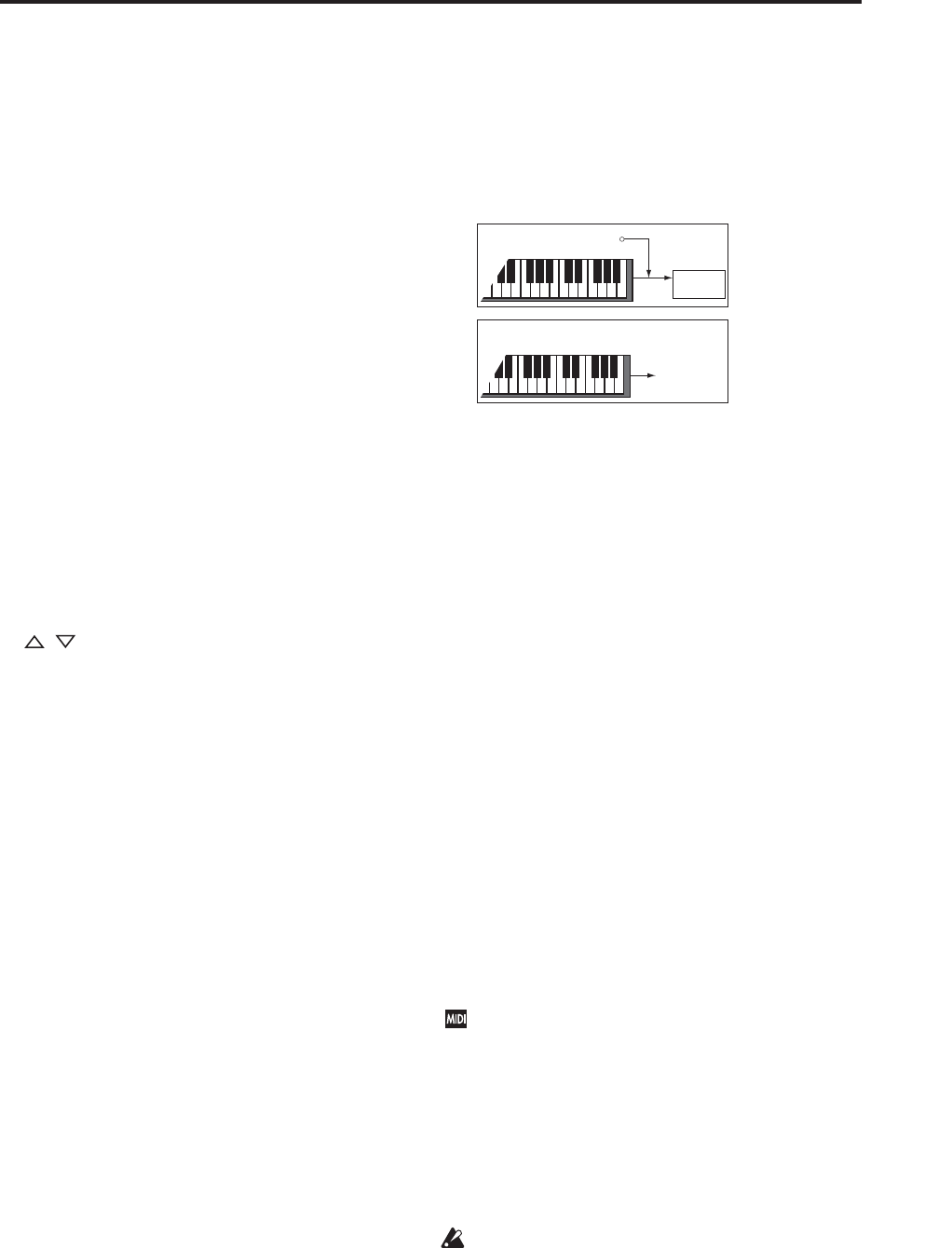
Combination P0: Play 0–1: Program Select/Mixer
325
If bank select and program change messages are
received on a MIDI channel that matches the MIDI
channel of a timbre whose Status is INT, the
program of that timbre will change. However if the
MIDI channel of the incoming message matches the
global MIDI channel “MIDI Channel,” then the
combination will change.
If you do not want the combination to change, you
can either change the global MIDI channel so that it
does not match the channel on which the program
change messages are being received, or you can
uncheck “Combination Change” (Global 1–1c). You
can also uncheck “Bank Change” so that only the
program number will change and the bank will
remain the same.
If you wish to change the program assigned to
certain timbres without changing the combination,
you can also set Enable Program Change (3–1a) so
that the program will change on certain timbres but
not on others.
Bank/Program Select
1. Press the popup button at the left of Program
Select to get the Bank/Program Select menu.
2. Press the left tab to select a bank.
3. Choose the desired program from the list. You can
directly press a program in the list, or use the
/ switches.
If there are more programs than can be shown in the
screen, use the scroll buttons to see the remaining
programs.
4. If you check “Favorite,” only the programs you
marked as Favorites will be shown.
You cannot select this if no programs in the selected
bank are marked as Favorites.
5. Press the OK button to execute, or press the Cancel
button to cancel your selection.
Status [Off, INT, EXT, EX2]
This sets whether the Timbre controls the internal
sounds, or external MIDI devices.
When controlling external MIDI devices, it also allows
you to choose between using the internal Bank Select
numbers (as set by the front-panel buttons), or using
custom Bank Select settings to match the external
device.
Off: Use this to disable the Timbre. With this setting,
the Timbre’s Program will not sound, and MIDI data
will not be transmitted. Also, any EXi fixed resources
used by the Program will be freed.
INT: Use this to make the Timbre play internal sounds.
With this setting, the Timbre’s Program will respond to
both the local keyboard and MIDI input on the
Timbre’s MIDI channel. The Timbre will not transmit
MIDI data.
EXT: Use this to play an external MIDI device, with
Bank Select via the front-panel Bank buttons. With this
setting, the Timbre’s Program will not respond to
either the local keyboard or MIDI input. MIDI will be
transmitted to external devices on the selected MIDI
channel.
EX2: Use this to play an external MIDI device, with
custom-set Bank Select via the Bank Select LSB and
MSB parameters, on the MIDI tab of the Timbre
Parameters page. In all other ways, this is the same as
EXT.
For more information, see “Bank Select MSB (When
Status = EX2)” on page 360.
Using the control surface to make timbre settings
You can use the control surface to edit the mix
parameters for each Timbre, including PLAY/MUTE,
Solo On/Off, Pan, Volume, FX sends, and EQ. These
can also be controlled from the mixer section of the
front panel, or from the P0– Control Surface page of the
LCD screen.
For more information, see “Adjusting the mix” on
page 70 of the Operation Guide.
Play/Mute [Mute, Play]
This setting mutes a timbre. The setting will alternate
each time you press the Play/Mute button.
Mute: The timbre will not sound.
Play: The timbre will sound.
Tip: You can use the control surface to control this
parameter. (“Using the control surface to make timbre
settings” on page 325)
Solo On/Off [On, Off]
This setting switches the Solo function on/off.
Only timbres that are set to Solo On will be heard.
Other timbres (and audio inputs: 0–8a) will be muted.
The setting will alternate each time you press the Solo
button.
Timbres that have been silenced by the Mute or Solo
functions will not transmit note-on/off messages on
the MIDI channel assigned for their track when the
timbre’s Status (2–1a) is BTH, EXT, or EX2.
The Solo function operates differently depending on
the setting of the Exclusive Solo page menu command.
If Exclusive Solo is off, you can turn Solo on for more
than one timbre.
If Exclusive Solo is on, pressing a Solo button will turn
Solo on for only that timbre.
Solo settings are not preserved when you write a
combination.
Tip: You can use the control surface to control this
parameter. (“Using the control surface to make timbre
settings” on page 325)
Pan [RND, L001…C064…R127]
This specifies the pan of each timbre.
Tone
generator
MIDI IN
INT
MIDI OUT
EXT, EX2


















